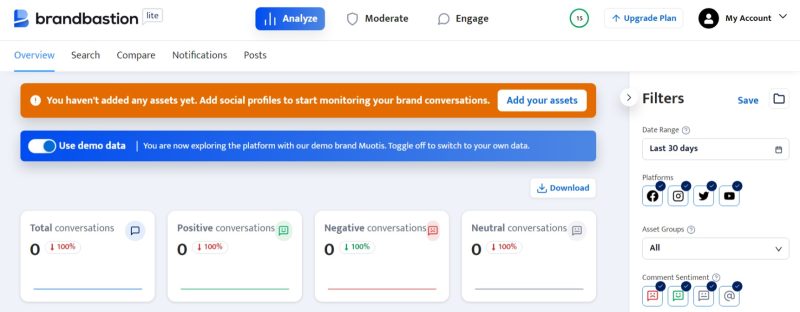According to the Power Reviews report, as many as 97% of customers check product reviews before buying. However, many of them do not stop at making sure the product will meet their expectations. They will also check the reviews of the store where they want to make a purchase. In this case, 70% of customers will filter stores by reviews and exclude those with a rating lower than four out of five stars (Review Trackers, 2022). This is why it is so important for companies that want to succeed in the e-commerce industry to actively manage customer reviews.
Customer feedback management with AI – table of contents:
How does AI understand e-commerce customer feedback?
Reviews are emotions and moods expressed by customers about your store. Customers describe their impressions in text by writing full sentences or single words. They also include emoticons, gifs and even short audio or video recordings. Buyers, on the other hand, are mainly guided by emotions and first impressions.
There’s a reason Google is the most popular review site. Zero-click searches, which in 2022 accounted for 57% of searches from mobile devices and 53% from computers, mean that more than half of users read Google reviews directly from search results and make decisions based on that.
So how do we improve the first impression our store makes? The answer is by working with artificial intelligence. AI can help manage customer feedback using sentiment analysis. But how can AI understand e-commerce customer feedback?
Sentiment analysis is the process of determining what sentiment has been expressed in a customer comment:
- satisfaction – “Great service, everything awesome :-)”
- surprise – “The package made my day, an all-organic package smelling of lavender!”
- confidence – “I’m ordering for the next time and I’m always satisfied, fast delivery, and even when there was a return everything without a problem.”
- disappointment – “It was supposed to be blue, and it’s a pistachio color, I sent it back.”
- annoyance – “Two weeks waiting for shipment. I would have brought it from the store faster.”
- anger – “This is some kind of mockery, defective product, no invoice, do not recommend to anyone!”
Artificial intelligence can quickly analyze numerous utterances through Natural Language Processing (NLP) and Machine Learning (ML). NLP helps understand the linguistic structure of utterances by identifying:
- Keywords and phrases used – good, great, hopeless;
- The tone of the statement – positive, negative, neutral; and even
- The context of the opinion – what product it is about when it was issued, where it is posted.
With NLP, machines can “understand” text at a human-like level. Machine learning (ML), in turn, is used to automatically classify these statements based on predetermined categories of emotion or mood (positive, negative, neutral). In practice, the ML model is trained on a large dataset where different opinions are already pre-rated by humans. After a period of training, the model can independently evaluate the sentiment of new opinions with high accuracy. But what can be done with the results thus obtained?

How to use sentiment analysis for e-commerce feedback management?
Manually analyzing all customer reviews would require a huge amount of time and work. Using NLP and ML, you can effortlessly analyze all the data coming from your store and use this knowledge for effective feedback management. The first step, therefore, is a well-executed sentiment analysis.
Once the results of the sentiment analysis have been obtained, so that the artificial intelligence “understands” what each opinion expresses, the next step is to segment them, i.e. organize them according to their business relevance, for example:
- by category of the product to which they apply – to see which products are worth offering in your store and which categories to expand,
- time of opinion publication
- specific problems – such as delays in delivery or product quality.
This allows you to target specific areas of concern. For example, if you notice an increase in negative feedback about your deliveries, you can quickly identify the problem and implement appropriate countermeasures, such as changing suppliers or introducing additional quality control steps.
The next step is to respond in a targeted and individualized manner. Positive feedback can help in building customer loyalty through thank-you notes or special offers. Negative feedback, on the other hand, is an opportunity to improve and demonstrate that as a company you are listening to your customers. You can proactively respond by offering solutions to difficulties, which can cause customers to change the review thus improving the store’s image. In addition, you can utilize the collected data to train your customer service team, improve features on your website or introduce new products according to customer expectations. To properly respond to customer feedback, you can also enlist the help of artificial intelligence.
Benefits of using artificial intelligence to respond to customer feedback
Artificial intelligence-based tools make it possible to generate immediate and personalized responses to customer feedback. They help resolve customer issues quickly, thereby improving customer satisfaction. AI can also monitor customer reviews for negative content and take appropriate action if necessary, such as removing fake reviews or informing relevant people about hurtful reviews.
The use of artificial intelligence-based tools for online reputation management is first and foremost:
- increased efficiency – AI can automate monitoring of reviews, identifying negative feedback and generating responses.
- improved accuracy – AI can analyze customer feedback more accurately than humans. This can help identify trends and patterns that you might otherwise miss.
- personalized responses – AI can generate personalized responses to customer feedback. This can help you build relationships with your customers and improve customer satisfaction.
- better transparency – AI can help you track your online reputation over time. This can help you identify areas where you need to improve and make changes accordingly.
3 AI tools for customer feedback management
The three most interesting tools that will help you deal with taking care of your store’s online reputation are:
- RepBot (https://repbot.ai/) – an automated online reputation management tool that uses AI to monitor and analyze customer reviews on more than 100 websites, generate customized responses, publish them to Google and Facebook, and detect negative reviews. It also integrates with Shopify, WooCommerce and other e-commerce platforms.
- MARA (https://www.mara-solutions.com/) is a tool that generates personalized responses to customer reviews on various platforms. It can respond in multiple languages and work with any type of review because it writes individually tailored responses to each review, without templates. With Mara, companies quickly and efficiently identify and respond to negative reviews, which can help improve their online reputation.
- BrandBastion (https://www.brandbastion.com/) – a comprehensive AI-based customer feedback and e-commerce reputation management platform. It helps companies monitor, analyze and respond to customer reviews across all channels, including Facebook, Twitter, Instagram and YouTube, as well as review sites.
RepBot.ai can collect customer feedback from a variety of sources, such as social media, review sites and customer service tickets. It can also identify negative reviews and flag them so they don’t escape the company’s attention, and can even generate personalized responses to negative reviews.
It has an extra feature, you can set up automatic messages and reminders to encourage customers to give feedback, as well as display the best reviews on the store’s website with customized widgets.

Source: RepBot (https://repbot.ai/)
The RepBot website also offers two free tools showing a fraction of its capabilities – a review response generator (https://repbot.ai/free-tools/ai-review-response) and a tool for detecting unsubstantiated negative e-commerce reviews on Google (https://repbot.ai/free-tools/remove-negative-google-reviews)

Source: MARA (https://www.mara-solutions.com/

Source: BrandBastion (https://www.brandbastion.com/)
BrandBastion allows you to quickly respond to customer feedback and prevent negative situations from escalating. It also offers features for detecting and removing fake reviews, as well as for generating responses and positive content, such as customer testimonials. BrandBastion uses sentiment analysis to understand customer feedback and take appropriate action. We find the reporting feature particularly handy as it lets you track campaign results and monitor progress over time.
Summary
Artificial intelligence, with its advanced natural language processing and machine learning capabilities, offers solutions to effectively analyze and segment opinions. Thanks to AI, companies not only gain precise insight into the emotions and needs of their customers but can also generate personalized responses in real time, resulting in increased customer satisfaction and building a positive brand image.
However, this is only the beginning of the possibilities of artificial intelligence. Soon, AI tools will be even more advanced, enabling complex analysis of consumer behavior and predictions of their future decisions. Moreover, they will be able to automatically respond to market dynamics, adjusting product offers or streamlining logistics processes based on sentiment analysis. One thing is certain: e-commerce businesses operating locally and internationally that do not invest in these technologies may be left behind.
If you like our content, join our busy bees community on Facebook, Twitter, LinkedIn, Instagram, YouTube, Pinterest, TikTok.
Author: Robert Whitney
JavaScript expert and instructor who coaches IT departments. His main goal is to up-level team productivity by teaching others how to effectively cooperate while coding.
AI in e-commerce:
- E-commerce automation. 5 areas of e-commerce worth automating using artificial intelligence
- Marketing texts for e-commerce with the help of artificial intelligence. 5 best tools
- Advertising graphic design with AI
- Customer feedback management with AI. Can Artificial intelligence take care of your online store's reputation?
- The AI revolution in e-commerce
- Personalization of e-commerce customer communication in the new era of AI
- Chatbot vs voicebot - which one to choose for e-commerce?
- AI keys to increase sales in e-commerce
- Optimizing e-commerce pricing strategy with artificial intelligence
- E-commerce pricing management. 4 best AI tools
- The future of e-commerce. What business opportunities are opening up for shopping in the metaverse?


















